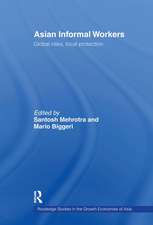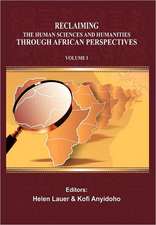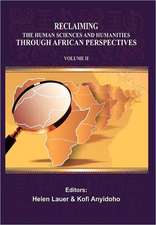The Capability Approach, Empowerment and Participation: Concepts, Methods and Applications: Rethinking International Development series
Editat de David Alexander Clark, Mario Biggeri, Alexandre Apsan Fredianien Limba Engleză Hardback – 27 mai 2019
This book explores the linkages between Amartya Sen’s Capability Approach and participatory forms of development – especially those associated with critical pedagogy and empowerment from the bottom-up. It shows how the capability approach and the participatory movement can complement and reinforce each other helping to ensure that democratic principles are respected and become the foundation for sustainable human development. The Capability Approach provides guiding principles for protecting the transformative roots of participation (safeguarding ownership, accountability and empowerment), while participation delivers vital methods for making the Capability Approach operational. Divided into three overlapping parts that focus on concepts, methods and applications, this work draws on diverse fieldwork experiences to unpack power relations, address adaptive preferences, explore individual and collective agency, consider new partnerships for development, and develop innovative concepts.
Din seria Rethinking International Development series
-
 Preț: 388.72 lei
Preț: 388.72 lei -
 Preț: 387.75 lei
Preț: 387.75 lei -
 Preț: 392.60 lei
Preț: 392.60 lei -
 Preț: 387.75 lei
Preț: 387.75 lei - 18%
 Preț: 780.82 lei
Preț: 780.82 lei - 15%
 Preț: 646.62 lei
Preț: 646.62 lei -
 Preț: 390.63 lei
Preț: 390.63 lei -
 Preț: 394.51 lei
Preț: 394.51 lei -
 Preț: 391.61 lei
Preț: 391.61 lei - 15%
 Preț: 644.18 lei
Preț: 644.18 lei -
 Preț: 394.87 lei
Preț: 394.87 lei -
 Preț: 381.98 lei
Preț: 381.98 lei - 18%
 Preț: 896.39 lei
Preț: 896.39 lei -
 Preț: 394.51 lei
Preț: 394.51 lei - 18%
 Preț: 729.53 lei
Preț: 729.53 lei -
 Preț: 386.81 lei
Preț: 386.81 lei - 15%
 Preț: 648.24 lei
Preț: 648.24 lei - 15%
 Preț: 500.73 lei
Preț: 500.73 lei -
 Preț: 218.38 lei
Preț: 218.38 lei -
 Preț: 389.31 lei
Preț: 389.31 lei - 18%
 Preț: 783.35 lei
Preț: 783.35 lei -
 Preț: 396.40 lei
Preț: 396.40 lei -
 Preț: 387.58 lei
Preț: 387.58 lei
Preț: 632.80 lei
Preț vechi: 791.01 lei
-20% Nou
Puncte Express: 949
Preț estimativ în valută:
121.11€ • 125.95$ • 101.35£
121.11€ • 125.95$ • 101.35£
Carte disponibilă
Livrare economică 21 februarie-07 martie
Livrare express 06-12 februarie pentru 45.29 lei
Preluare comenzi: 021 569.72.76
Specificații
ISBN-13: 9781137352293
ISBN-10: 1137352299
Pagini: 320
Ilustrații: XXV, 428 p. 16 illus., 2 illus. in color.
Dimensiuni: 148 x 210 x 33 mm
Greutate: 0.89 kg
Ediția:1st ed. 2019
Editura: Palgrave Macmillan UK
Colecția Palgrave Macmillan
Seria Rethinking International Development series
Locul publicării:London, United Kingdom
ISBN-10: 1137352299
Pagini: 320
Ilustrații: XXV, 428 p. 16 illus., 2 illus. in color.
Dimensiuni: 148 x 210 x 33 mm
Greutate: 0.89 kg
Ediția:1st ed. 2019
Editura: Palgrave Macmillan UK
Colecția Palgrave Macmillan
Seria Rethinking International Development series
Locul publicării:London, United Kingdom
Cuprins
1. The Human Development and Capability Approach – The Role of Empowerment and Participation.- 2. The Practice of Participation and the Capability Approach.- 3. Power and Deliberative Participation in Sen’s Capability Approach.- 4. Balancing Pessimism of the Intellect and Optimism of the Will: Some Reflections on the Capability Approach, Gender, Empowerment and Education.- 5. Notions of Empowerment and Participation: Contributions from and to the Capability Approach.- 6. Process and Outcomes: participation and empowerment in a multidimensional poverty framework.- 7. Participatory Development: A Sustainable Approach for Reducing Inequality and Fighting Poverty? The Example of Disability Policies in Afghanistan.- 8. Children and Youth Participation in Decision Making and Research Processes.- 9. The Integrated Capabilities Framework: Exploring Multiculturalism and Human Well-Beingin Participatory Settings.- 10. Participatory Research Methods and the Capability Approach: Researching the Housing Dimensions of Squatter Upgrading Programmes in Salvador da Bahia, Brazil.- 11. Participatory Monitoring of Development Projects in the South Pacific.- 12. Planning and Managing for Human Development: What Contribution Can the Capability Approach Make?.- 13. Emancipatory Research as Empowerment: An Illustration from a Research Study of Persons with Disabilities in Palestine.- 14. Capability Development and Decentralisation.- 15. Participation, Empowerment and Capabilities: Key Lessons and Future Challenges
Notă biografică
David Alexander Clark is Affiliated Lecturer in the Centre of Development Studies at the University of Cambridge, UK.
Mario Biggeri is Associate Professor in Development Economics at the Department of Economics and Management at the University of Florence, Italy.
Alexandre Apsan Frediani is Associate Professor in the Bartlett Development Planning Unit at University College London, UK.
Mario Biggeri is Associate Professor in Development Economics at the Department of Economics and Management at the University of Florence, Italy.
Alexandre Apsan Frediani is Associate Professor in the Bartlett Development Planning Unit at University College London, UK.
Textul de pe ultima copertă
“[The] eventual adoption [of the capability approach] by research and policy analysts depends on the development of methods and applications which demonstrate implementation of the approach in concrete settings. This excellent volume contributes to this important task by linking concepts, methods and application, and by highlighting both the uses and the challenges of the capability approach.”
—Ravi Kanbur, Professor, Cornell University, USA
“This timely, comprehensive and well-organised volume brings together new work by leading researchers and will be essential reading for all students and researchers interested in the capability approach and its application.”
—Mozaffar Qizilbash, Professor, University of York, UK
“The capability approach has been centrally influential in moving development policy towards highlighting the importance of processes of empowerment and participation. This book provides useful insights intohow theory translates into the practical application of these valuable concepts.”
—Vijayendra Rao, Lead Economist, Development Research Group, World Bank, USA
—Ravi Kanbur, Professor, Cornell University, USA
“This timely, comprehensive and well-organised volume brings together new work by leading researchers and will be essential reading for all students and researchers interested in the capability approach and its application.”
—Mozaffar Qizilbash, Professor, University of York, UK
“The capability approach has been centrally influential in moving development policy towards highlighting the importance of processes of empowerment and participation. This book provides useful insights intohow theory translates into the practical application of these valuable concepts.”
—Vijayendra Rao, Lead Economist, Development Research Group, World Bank, USA
This book explores the linkages between Amartya Sen’s Capability Approach and participatory forms of development – especially those associated with critical pedagogy and empowerment from the bottom-up. It shows how the capability approach and the participatory movement can complement and reinforce each other helping to ensure that democratic principles are respected and become the foundation for sustainable human development. The Capability Approach provides guiding principles for protecting the transformative roots of participation (safeguarding ownership, accountability and empowerment), while participation delivers vital methods for making the Capability Approach operational. Divided into three overlapping parts that focus on concepts, methods and applications, this work draws on diverse fieldwork experiences to unpack power relations, address adaptive preferences, explore individual and collective agency, consider new partnerships for development, and develop innovative concepts.David Alexander Clark is Affiliated Lecturer in the Centre of Development Studies at the University of Cambridge, UK.
Mario Biggeri is Associate Professor in the Department of Economics and Management at the University of Florence, Italy.
Alexandre Apsan Frediani is Associate Professor in the Bartlett Development Planning Unit at University College London, UK.
Mario Biggeri is Associate Professor in the Department of Economics and Management at the University of Florence, Italy.
Alexandre Apsan Frediani is Associate Professor in the Bartlett Development Planning Unit at University College London, UK.
Caracteristici
Offers theoretical and practical solutions for safeguarding the transformative roots of participation and facilitating empowerment Reflects on local and global partnerships for sustainable human development Expands on key concepts in the literature including freedom, agency and empowered learning

























